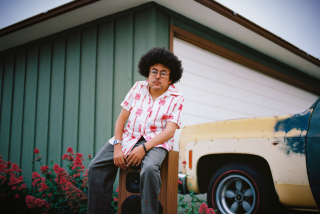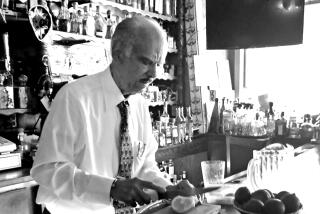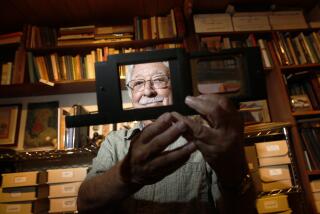‘Chunky’ Sanchez, voice of San Diego’s barrio, dies at 64
Ramon “Chunky” Sanchez, a San Diego music institution who gave voice to the barrio, has died, his family said.
Sanchez passed away last Friday, his eldest daughter, Ixcatli Sanchez, announced on Facebook. He would have been 65 on Sunday.
“Que Viva El Chunky y que Viva La Causa,” she wrote. She asked for privacy for the family.
Recognizable with his iconic handlebar mustache and guitar often in hand, Sanchez was an activist, artist, musician and educator.
He was among the many founders of Chicano Park in the Barrio Logan neighborhood and became one of its strongest protectors. Los Alacranes, the band he founded with his younger brother Ricardo, has been a fixture in San Diego’s Chicano social and political community since 1975.
“I think he was one of those transcendental figures,” said longtime friend Steve Kader, a music talent buyer who has booked Sanchez for local festivals. “He really spoke for a lot of different people, always spoke from the heart and the soul.”
Farm labor leader Cesar Chavez loved his music so much that he invited Sanchez to play at United Farm Workers union rallies to inspire and excite the crowd — first with the band La Rondalla Amerindia de Aztlán and later with Los Alacranes, or the Scorpions.
Favorites sung at those rallies such as “Huelga en General” (“The Strike”) and the bilingual “El Picket Sign” remained in the band’s repertoire long after.
Sanchez was born Oct. 30, 1951, in Blythe to farm laborer parents. He and his brother learned to sing and play traditional music from their mother, a talented singer, and their uncles.
He spent much of his childhood in the fields.
“At that time,” Sanchez recalled in a 1998 interview, “I thought I’d become the best tractor driver in the valley. I was refueling the tractor one morning, and my dad and the boss were watching. And the boss said: ‘You know what, Ramon? Your son will make a good foreman on this ranch when you are gone.’
“I heard that, and I thought: ‘This guy has plans for me already. I better start making my own plans!’ It was then that I decided to go to college. And to this day, I haven’t been back to that ranch.”
Sanchez went to San Diego State University as a Mexican American studies major. It was in college that the brothers played publicly for the first time.
His appetite for activism was kick-started as a college student in 1970 when he joined hundreds of barrio residents in a march toward a small plot of land under the San Diego-Coronado Bridge. Politicians were planning to put a California Highway Patrol office there, but the residents wanted the land for something different.
“I wasn’t quite sure what was going on, but when we got there I was part of the Chicano Park takeover,” Sanchez remembered. “I grabbed a pick and shovel — I was very familiar with those tools — and started turning the dirt. I knew they were going to plant something.”
The park celebrates Chicano heritage and is known worldwide for its colorful murals of icons such as Chavez, Ché Guevara, Frida Kahlo and, later, Sanchez himself. He has served as a leader preserving the park’s history.
Reaching out to troubled youth was another of Sanchez’s priorities.
In the 1980s, he directed the city’s Street Youth Program, which used street-wise counselors to steer kids away from gangs and crime. He was later the education coordinator for Critical Hours, the after-school program at Barrio Station Youth Center in Logan Heights.
In the song “Rising Souls,” Los Alacranes pushed for investing in youth and community: “We’ve gotta educate, not incarcerate/ The souls of humanity will shine/ Vamos, mis amigos, let’s try some brotherhood/ No need to kill another over a neighborhood.”
In 2013, Sanchez was one of nine recipients of the National Endowment for the Arts’ National Heritage Fellowships, the country’s highest honor in folk and traditional arts. He is among the few Chicano artists to have earned the recognition.
Sanchez is survived by his wife, Isabel, five children and many grandchildren.
Union-Tribune staff writer George Varga contributed to this story.
kristina.davis@sduntiontribune.com
Davis writes for the San Diego Union-Tribune
More to Read
Start your day right
Sign up for Essential California for news, features and recommendations from the L.A. Times and beyond in your inbox six days a week.
You may occasionally receive promotional content from the Los Angeles Times.






